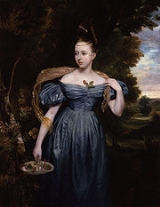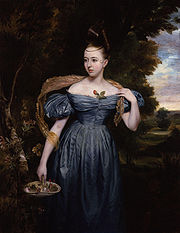
Clara Novello
Encyclopedia

Vincent Novello
Vincent Novello , English musician, son of an Italian who married an English wife, was born in London....
, a musician and music publisher, and his wife, Mary Sabilla Hehl.
Clara Novello's acclaimed soprano and pure style made her one of the greatest vocalists, alike in opera
Opera
Opera is an art form in which singers and musicians perform a dramatic work combining text and musical score, usually in a theatrical setting. Opera incorporates many of the elements of spoken theatre, such as acting, scenery, and costumes and sometimes includes dance...
, oratorio
Oratorio
An oratorio is a large musical composition including an orchestra, a choir, and soloists. Like an opera, an oratorio includes the use of a choir, soloists, an ensemble, various distinguishable characters, and arias...
and on the concert stage, from 1833 onwards. In 1843 she married Count Gigliucci, and retired in 1861. Charles Lamb wrote a poem ("To Clara N.") in her praise.
Biography
Her voice and musical ear were first noticed by her father's pupil Edward Holmes (musicologist)Edward Holmes (musicologist)
Edward Holmes was an English musicologist, music critic, pianist, and music educator. Born just outside London, he was a pupil of Vincent Novello. He spent his early career earning a living as a piano teacher. In 1827 he visited Germany, and upon returning to England published his first book, A...
, who began to give her lessons before she was five. At the age of 11 her parents took her to Paris to study at the Institution Royale de Musique et Religieuse. She only studied there for one year due to the July Revolution
July Revolution
The French Revolution of 1830, also known as the July Revolution or in French, saw the overthrow of King Charles X of France, the French Bourbon monarch, and the ascent of his cousin Louis-Philippe, Duke of Orléans, who himself, after 18 precarious years on the throne, would in turn be overthrown...
of 1830. By returning home, she was able to participate in her father's musical activities.
In 1833, she performed at the Three Choirs Festival in Worcester and in 1834 she performed at the Royal Musical Festival at Westminster Abbey. In 1837, she sang Felix Mendelssohn
Felix Mendelssohn
Jakob Ludwig Felix Mendelssohn Barthóldy , use the form 'Mendelssohn' and not 'Mendelssohn Bartholdy'. The Grove Dictionary of Music and Musicians gives ' Felix Mendelssohn' as the entry, with 'Mendelssohn' used in the body text...
's St. Paul to commemorate the new Birmingham town hall. Mendelssohn then arranged for her to at the Gewandhaus concerts in Leipzig.
She went to Milan to study operatic stage in 1839. In 1841, made her debut as the title role in Gioachino Rossini's Semiramide in Pauda.
While on contract in Fermo, Italy in 1841, she met a young aristocrat, Count Giovanni Baptista Gigliucci. They married in 1843. She devoted herself to her husband and children for the first six years of marriage and shared his involvement in the struggle for Italian independence. In 1849, the collapse of the resurgence drove them from Fermo in exile. After being offered a contract in Rome, they decided that she should resume her professional career to provide for her family. In 1851 she returned to England and played in many engagements.
Her husband joined the liberation movement led by the House of Savoy, and the union of the former papal states with Piedmont in 1861 led to their return from exile and Clara's final retirement from professional life. She survived her husband by 15 years.
External Reference
- Autograph letter by Clara Novello at Houghton Library, Harvard University

